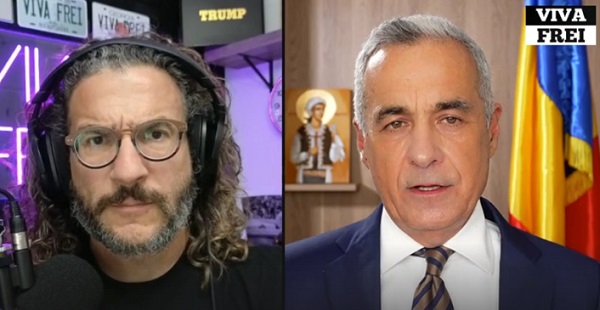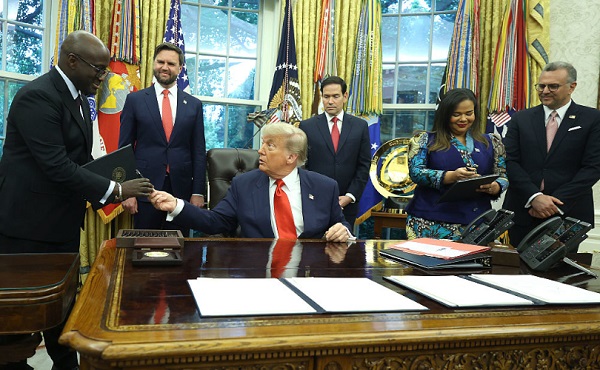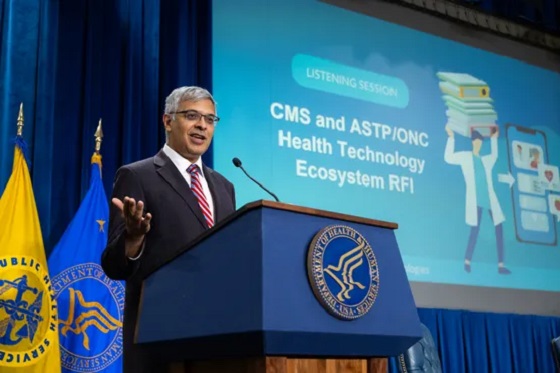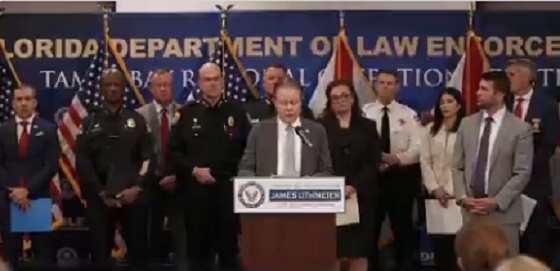International
Coup in Romania – Fascinating interview with Presidential hopeful Calin Georgescu

Funny how a lot of people branded “far right” by progressives and the corporate media sound pretty reasonable when you see / hear them in conversation.
Take Romanian Presidential candidate Calin Georgescu. As an independent candidate, Georgescu found himself leading the current Presidential race in Romania when his campaign found itself under attack.
Georgescu opposes financial and military support of the war in neighbouring Ukraine. For that he’s been called not pro-peace, but pro-Russian and anti-NATO. His campaign effectively used TikTok as any other potenial candidate hoping to win an election in 2024 would do. Opponents say his social media success simply has to be the result of Russian influence. They have no proof, but they’re already in power so they don’t seem to need any.
Georgescu has an extremely interesting resume for someone who is apparently ‘far-right’. In 2015 and 2016 he was Executive Director of the United Nations International Institute for Sustainable Development. His political experience in Romani comes from a long stint in the Office for the Environment including two years as Secretary General of the Ministry of Environment.
He followed that up with a long run as Executive Director of the National Centre for Sustainable Development in Bucharest, before joining the United Nations.
Fascinating route to far-right extremism indeed.
Of course no one called him ‘ultranationalist, extremist, or far-right while he was polling around 5%. But when his success in the first round catapulted him to 23% of the vote for President, putting him in the lead heading into the decisive second round of Presidential voting, the Constitutional Court of Romania annulled the results.
Among his “far-right” campaign initiatives were strengthening Romania’s defence capabilities, diversifying Romania’s diplomatic relations, increased support for farmers, promoting energy and food production, and reducing dependency on imports.
From Viva Frei on Rumble
Călin Georgescu’s unexpected success in the first round of the presidential election was attributed to a massive social media campaign on TikTok, which was later scrutinized for possible foreign influence, particularly from Russia. The court’s decision to annul the election results was based on these concerns and allegations of campaign finance irregularities. It is nothing less than the desecration of the democratic process.
International
Trump predicts Israel-Hamas ceasefire ‘within the next week’

U.S. President Donald Trump hands a pen to Minister of Foreign Affairs and Cooperation of Rwanda Olivier Nduhungirehe as he meets with Nduhungirehe and the Foreign Minister of the Democratic Republic of the Congo Thérèse Kayikwamba Wagner in the Oval Office at the White House on June 27, 2025
From LifeSiteNews
President Trump said the US is sending aid to Gaza as part of a push to end the conflict between Israel and Hamas.
President Donald Trump has predicted a ceasefire between Israel and Hamas in Gaza “within the next week.”
Amid the signing of a peace deal between the Democratic Republic of the Congo and the Republic of Rwanda in the White House’s Oval Office on Friday evening, Trump addressed the “terrible situation” in the Gaza strip and stated that his administration believes “within the next week, we’re going to get a ceasefire.”
President Trump on Gaza: "We think within the next week we're going to get a ceasefire." pic.twitter.com/cWIRGnm963
— CSPAN (@cspan) June 27, 2025
Continuing, the president noted that the U.S. is supplying “a lot of money and a lot of food” to Gaza, “because we have to … because people are dying.”
“We’re doing that because I think we have to on a humanitarian basis,” Trump said.
Touting recent successes in brokering peace globally, Trump boasted, “In a few short months we have now achieved peace between India and Pakistan, Israel and Iran, and the DRC and Rwanda.”
On the conflict between Israel and Iran, the president stressed that the result of American intervention has been that “we ended up with no nuclear weapons,” and that, with the “12-day war” having come to an end, “hopefully there can be a lot of healing … Healing is starting.”
espionage
Trump admin cracks down on China’s silent invasion of U.S. science

Quick Hit:
The Trump administration has launched a sweeping national security investigation into foreign scientists working in U.S. research institutions, targeting those from adversarial countries like China amid fears of espionage and biological threats.
Key Details:
- The probe targets as many as 1,000 foreign scientists inside the NIH alone, focusing heavily on Chinese nationals.
- Intelligence agencies are involved following multiple arrests of Chinese researchers attempting to smuggle dangerous pathogens into the U.S.
- The effort comes after repeated GAO warnings and revelations from a Chinese defector who says Beijing embeds agents in American labs.
Diving Deeper:
The Trump Administration has launched an intensive, behind-the-scenes investigation into hundreds of foreign scientists working in American research institutions—many of them tied to China’s communist regime. According to officials, the review began weeks ago and involves coordination with intelligence and security agencies.
The sweeping audit—prompted by longstanding concerns of foreign influence, espionage, and theft of intellectual property—has zeroed in on nearly 1,000 researchers within the National Institutes of Health (NIH) alone. Most are believed to have gained entry to the U.S. with help from federal research agencies during prior administrations, often without proper vetting.
“The Trump administration is committed to safeguarding America’s national and economic security,” White House spokesman Kush Desai told Just the News. “Taxpayer dollars should not and cannot fund foreign espionage against America’s industrial base and research apparatus.”
That warning is no longer hypothetical. In just the last month, federal officials say three Chinese scientists were arrested attempting to smuggle deadly pathogens into the U.S., including toxic fungi and crop-destroying roundworms—raising fresh fears of agroterrorism.
According to Dr. Li-Meng Yan, a Chinese virologist who defected to the U.S. in 2020, many scientists entering the U.S. from China are effectively agents of the Chinese Communist Party. “They have signed the contract with Chinese government to go back to China, serve for China with whatever they can get from the U.S.,” Yan said. “They become the CCPs’ kind of agents… like the parasites that go into your body.”
Years of inaction from federal agencies are partly to blame. The Government Accountability Office (GAO) has issued more than a half-dozen scathing reports warning that the NIH and partnering universities lack the safeguards to prevent foreign theft of research and influence over scientific projects funded by U.S. taxpayers.
In one 2021 report, GAO bluntly stated that “U.S. research may be subject to undue foreign influence” and cited the NIH’s failure to enforce conflict-of-interest policies, particularly with scientists tied to China.
The crackdown now underway comes amid a surge of related criminal activity. In one case, Chinese scientist Hao Zhang was convicted in 2020 for a scheme dating back to 2006 to steal proprietary semiconductor technology and launch a competing business in China. In another, a cybersecurity professor at Indiana University, Xiaofeng Wang, had his home raided by the FBI earlier this year and was quietly fired, though he has not been charged with any crime.
As part of the broader clampdown, the NIH recently issued new guidance barring researchers from funneling U.S. tax dollars to foreign partners through sub-grants. And the FDA has now halted all trials that export Americans’ cells to labs in hostile nations for genetic engineering—an issue of growing concern.
Congressional allies are backing the administration’s effort, with Rep. Nathaniel Moran (R-Texas) calling for sweeping reforms. “We’ve got to strengthen our own systems from within,” Moran said, “and we’ve got to push back in the trade world, in the tariff world and in the business practices world against China.”
With growing evidence of coordinated foreign espionage and exploitation of U.S. research systems, the administration’s covert operation marks a critical step in defending national security—and could reshape how America handles scientific collaboration for years to come.
-

 Bruce Dowbiggin22 hours ago
Bruce Dowbiggin22 hours agoWhat Connor Should Say To Oilers: It’s Not You. It’s Me.
-

 Business23 hours ago
Business23 hours agoFederal fiscal anchor gives appearance of prudence, fails to back it up
-

 Business21 hours ago
Business21 hours agoThe Passage of Bill C-5 Leaves the Conventional Energy Sector With as Many Questions as Answers
-

 Alberta19 hours ago
Alberta19 hours agoAlberta poll shows strong resistance to pornographic material in school libraries
-

 Business17 hours ago
Business17 hours agoCanada should already be an economic superpower. Why is Canada not doing better?
-

 Crime18 hours ago
Crime18 hours agoFlorida rescues 60 missing kids in nation’s largest-ever operation
-

 Banks20 hours ago
Banks20 hours agoScrapping net-zero commitments step in right direction for Canadian Pension Plan
-

 Also Interesting2 days ago
Also Interesting2 days agoDodgers Hitting Their Stride: Winning Streak Sets Stage for Key Matchups



